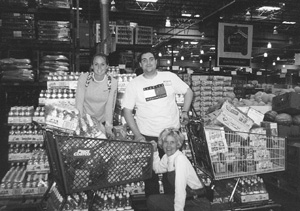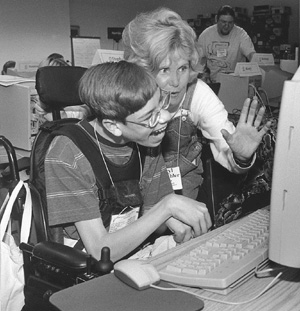Summer Study 2000: What Did the Phase I Scholars Do?
DO-IT Phase I Scholars participate in a two-week, live-in summer study session on the University of Washington campus in Seattle. They learn about college life; surf the Internet; interact with peers, staff, and mentors; and have fun. Below, '00 Phase I Scholars share some of their experiences.
Life in the Dorm
by '00 Scholars Susanna and Gretchen
DO-IT provides the opportunity to experience life away from home, living life in college dorm rooms. One of the many differences between home life and college life is that you live with a roommate. A dorm life is always interesting - there are people all around you, bathrooms to compete for, dorm food to experience, sports to challenge, obstacles to overcome. One of the main challenges in college is to keep in touch with family members. In this day and age, we have many options, such as e-mail, and cell phones. The only way to enjoy yourself in college is to make yourself at home. Some ways you can accomplish this are plastering your walls with N*SYNC pictures, bringing your TV, putting up Christmas lights, and hanging lots of pictures.

If you keep on friendly terms with everyone, you will do fine in college. The most important thing to remember is that if you respect people's space, time, and sleep, they will respect yours also.
Accessibility of Girls' Restroom in McCarty Hall
by '00 Scholars Corinna and Nora
DO-IT Scholars evaluate the accessibility of facilities and programs and make recommendations to create a more inclusive world. For example, below is an evaluation of the restroom for the girls in the McCarty Hall Summer Study dorm by Corinna, a wheelchair user and Nora, a Scholar who uses a walker.
Corinna-The community restroom on the second floor in McCarty Hall is pretty accessible for people in electric wheelchairs to maneuver in. I think the first time I went to look at it, I was kind of having second thoughts about its accessibility, but then I found out it is perfectly fine. The toilet in the handicap stall has a raised seat. The restroom has an adaptable shower area. And it has sinks you can get to very easily.
Nora-The restroom on McCarty's second floor is very accessible if you use a walker. Even if you have to use a small stall, there are handholds for balance. The sinks are easy to get to and can be leaned against if you need to. The shower area is pretty good, but you have to watch out for the step into the shower. It is fairly high for someone who can't lift a foot very far.
Postscript: McCarty Hall is now in the process of a major renovation. It is expected that input from DO-IT Scholars over the years will make it a model for accessibility.

Life in College
by '00 Scholars Jeff and Brian
Preparing to go to college is a time of change, of reorganization, and of new-found independence. If you are not able to adapt, you will surely sink, as opposed to swim. There are many things that must be done to prepare for college. First, tests must be taken. Students must chose between the SAT, ACT, and others, depending on the type of college they wish to attend. Also, the choice must be made as to whether to attend a local, out-of-state, or international university. The matter of moving comes next for some students. Transportation to the college is not much of an issue if the student is planning to live at home. For a college or university that is farther away, though, this must be considered. There are, of course, the orientations, the forms to fill out, and then, dealing with your new roommate.
College is completely different than high school. There are fewer things to study, but students will find themselves spending much, much more time studying. Students will also find that they will have much more time to socialize with their peers, and they will. College allows students to exercise their newly-found freedom and independence that comes both with adulthood and from living away from home.
Meeting New People at Summer Study
by '00 Scholars Jamie and Stephanie
We didn't expect to meet very many people here. There were 19 other Scholars whom we didn't even know, and that was scary. As we got later into the week, we got to know everyone. The other kids were doing the same thing that we were-trying to make new friends. This turned out to be a lot of fun. We got to know each other and it was great.

Experience Music Project
by '00 Scholars Ryan and Nathan
Visiting the EMP (Experience Music Project) was an interesting experience. It is a LARGE and overwhelming expanse from the outside. You enter into sky church. There is a place to pick up this little device that looks like a cross between a palm pilot, a suite for laser tag, and your TV remote. They are called MAGS. These are used for listening to information about the band(s) that are pictured in the cases. It is dark; you can hardly see. They feature bands that were either near/from Seattle or had an influence on music at some time. The EMP also has a lot of music artifacts, from Jimi Hendrix's clothes that he wore in some of his concerts, to lyrics to songs that were handwritten by the artist, to guitars donated by artists. Other than the poor lighting and the narrow selection of music, EMP is pretty good over all.
Postscript: DO-IT Scholars created a list of suggestions to make the EMP more accessible to people with a wide range of disabilities; DO-IT staff presented this list to EMP administrators who will report on progress at the next Summer Study.
SKIFORALL
by '00 Scholars Raleigh and Israel
SKIFORALL was very fun. We got to ride on all sorts of fun bikes and just have a blast. They had four-wheelers, two-wheelers, two-seaters, and bikes for people who aren't able to ride a regular bike. Is that cool or what? We all had a blast. The bikes really showed you that no matter what kind of disability you have, you can DO-IT.
Pacific Science Center
by '00 Scholars Deke and Nick
During Summer Study we went to the Pacific Science Center. It was great. We went to the IMAX, Laserium, and a cool robot lab. The only drawback to going on that Saturday is we didn't have enough time. We couldn't get through it all. Oh well, it was still a great experience.
When we went to the IMAX we thought that the dolphin story was very real. Nick said, "You really felt like you were in the water with them." Deke thought that the dolphin story was really realistic and very well done. We were very impressed. The Laserium was great. We both agree that if you have never been to one, it is definitely an experience that you don't want to miss. Nick said that it was cool because you could watch the music and listen all at the same time. Deke liked it because of the laser effects.
The robot thing was great. Deke thought that it was fun interacting with the robots. He got to play tic-tac-toe against the robot and it was fun. Nick liked the entire robot humor. "It was great," he said. He thought it was cool.
Overall we thought it was a great experience. We really enjoyed it. Like we said before, we wish we could have spent more time there.
Burke Museum
by '00 Scholars Andrea and Brooke
We visited the Burke Museum on the University of Washington campus. The museum is focused on the natural history of the Northwest. The Burke Museum is a fine example of an accessible museum that everyone can use. For people with visual impairments, they have objects that you can touch and videos that you can hear along with bigger text you can read easily. For people with hearing impairments, there are captions for the videos. There are also ramps and bigger buttons for people with physical impairments. For people with learning disabilities, the layouts of the rooms are very similar to each other making the facts more organized and easier to learn. The Burke Museum may be small, but it is laid out in a fashion that makes it excel, where other larger museums fail.